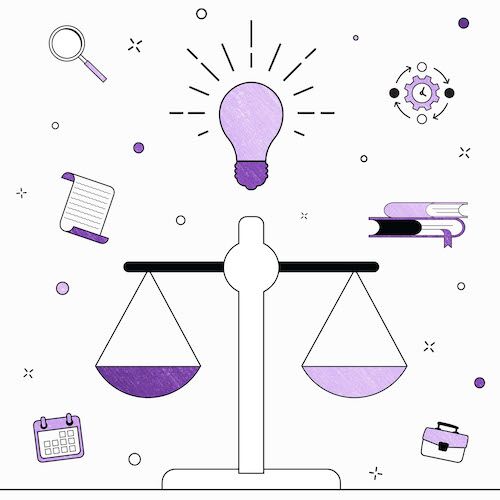American employees have certain privacy rights when it comes to their employment.
This includes the right to keep their personal emails private, the right not to be spied on, and the right to keep their social media profiles private.
In this chapter, we discuss employee privacy rights in more detail. We also discuss how employees can protect themselves from employers.
What are employee privacy rights?
Employee privacy rights are the legal protections that employees have from having their personal information disclosed without their consent. These rights come from a variety of sources, including federal and state laws, constitutional protections, and court decisions.
For example, the Federal Privacy Act of 1974 protects employees’ rights to keep their personal information private. This law requires that government agencies, including the Equal Employment Opportunity Commission (EEOC), protect employees’ personal information from being disclosed without their consent.
State employee privacy laws also protect these rights. One state’s constitutional right to privacy gives employees the right to keep their personal information private. This includes the right to keep their medical records and financial information private.
Employees also have a common law right to privacy. This is a legal right that comes from court decisions that act as precedents. The common law right to privacy gives employees the right to keep their personal information private from their employer.
For example, one court case held that an employee had the right to keep her pregnancy private from her employer. The court said that the employee had a “legitimate expectation of privacy” in her personal information.
Workplace surveillance
Of course, companies can reasonably monitor all events that happen on a daily basis for security purposes. But there are limits that prevent them from monitoring private employee actions.
Web activity and email privacy at work
The same employee privacy laws that protect employee privacy also protect employee web activity and email privacy. The Federal Wiretap Act protects employee email privacy. This law makes it illegal for employers to read their employees’ emails without their consent.
The Stored Communications Act also protects employee web activity and email privacy. This statute makes it illegal for employers to access or disclose an employee’s stored emails without their consent.
Employees also have a common law right to privacy in their web activity and email. This means that employers can’t read their employees’ emails or access their web activity without their consent.
Social media monitoring
Social media monitoring is the practice of employers spying on their employees’ social media accounts. This includes reading employee posts, looking at employee photos, and even accessing employee private messages.
Employees have a limited right to privacy in their social media accounts. This means that employers can’t read employee posts or access employee photos without their consent. However, employers can access employees’ private messages if they have a business need to do so.
For example, an employer might access an employee’s private messages if the employee is sending harassing or threatening messages to another employee, or if the employee is sharing confidential company information.
Phone privacy at work
Employees have a limited right to privacy in their work phone calls. This means that employers can listen to employee phone calls for business purposes.
For example, an employer might listen to employee phone calls to make sure that employees are following company policy. Or, an employer might listen to calls to investigate suspected employee misconduct.
But employers can’t listen to personal employee phone calls. For example, an employer can’t listen to employee phone calls to find out what they’re talking about or who they’re talking to.
Video surveillance at work
Employees also have a limited right to privacy in video surveillance at work. This means that employers can use video surveillance for business purposes.
For example, an employer might use video surveillance to investigate employee misconduct or to improve workplace safety.
But an employer can’t use video surveillance to spy on employees or to find out what they’re doing when they’re not working.
Post mail and deliveries
Can employers read mail and check deliveries meant for specific employees?
Generally, no. The U.S. Postal Service has strict regulations about what employers can and cannot do with employee mail.
These regulations make it illegal for employers to open employee mail or to intercept employee deliveries without the employee’s consent.
GPS tracking
GPS tracking is a legitimate practice in the trucking and haulage industry, helping companies keep track of their trucks, prevent theft, and improve operational efficiency.
GPS tracking can also be used to track employee whereabouts, even when they’re not working. This type of surveillance is generally illegal unless the employee has given their consent.
Physical searches
Physical searches are searches of an employee’s person or property. These searches can be conducted for business purposes, like to investigate employee misconduct.
Sometimes, physical searches can also be conducted for personal reasons. For example, an employer might search an employee’s office to find out what they’re working on or to see if they’re stealing company property.
Generally, employers can’t conduct physical searches without the employee’s consent. However, there are some exceptions to this rule. For example, employers can search an employee’s office if they have a warrant from an officer of the law or if the employee has been accused of a crime.
Background and credit checks
Employers often conduct background and credit checks on job applicants and employees. These checks can help employers find out if an employee has a criminal record or if they’re financially stable.
However, background and credit checks can also invade an employee’s privacy. For example, a background check might reveal sensitive information about an employee’s medical history or their financial situation.
Generally, employers can’t conduct background and credit checks without the employee’s consent. But there are some exceptions.
For example, employers can conduct a credit check if the employee is applying for a job that requires access to company finances or applying for a sensitive position in the government or financial industry may warrant a credit and background check.
Lifestyle discrimination
Employee privacy rights laws restrict companies from discriminating against their workers based on certain lifestyle choices. An employer can’t refuse to hire an employee because they smoke cigarettes or because they have tattoos.
But employers can take action against employees who engage in dangerous or illegal activities outside of work. For example, an employee who is arrested for drug possession could be fired from their job.
Privacy rights if working from home
If you’re working from home, your employer still can’t invade your privacy. For example, your employer can’t listen in on calls or read your emails without your consent.
However, there are some exceptions. For example, if you’re using company equipment to do work-related tasks, your employer might have the right to monitor your usage.
Additionally, if you’re working from home on a computer provided by your employer, they might be able to remotely access files and data stored on the device.
Before agreeing to work from home, understand your company’s policies regarding employee privacy. If your rights are violated, contact an employment lawyer.
Know your rights to privacy
Employee privacy rights laws are essential for protecting workers. If you’re concerned about your privacy at work, talk to your employer about their policies.
You could also file a complaint with the Equal Employment Opportunity Commission if you think your rights have been violated.
Pre-Paid Legal Services, Inc. (“PPLSI”) provides access to legal services offered by a network of provider law firms to PPLSI members through membership-based participation. Neither PPLSI nor its officers, employees or sales associates directly or indirectly provide legal services, representation, or advice. The information available in this blog is meant to provide general information and is not intended to provide legal advice, render an opinion, or provide any specific recommendations. The blog post is not a substitute for competent legal counsel from a licensed professional lawyer in the state or province where your legal issues exist, and the reader is strongly encouraged to seek legal counsel for your specific legal matter. Information contained in the blog may be provided by authors who could be a third-party paid contributor. All information by authors is accepted in good faith, however, PPLSI makes no representation or warranty of any kind, express or implied, regarding the accuracy, adequacy, validity, reliability, availability, or completeness of such information.





